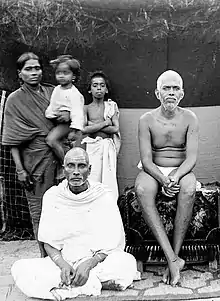Manavasi Ramaswami Iyer | |
|---|---|
 Manavasi Ramaswami Iyer (left, sitting) with his family and Ramana Maharshi | |
| Personal | |
| Born | Before 1879[1]: 183 |
| Died | After 1950 |
| Religion | Hinduism |
| Nationality | Indian |
| Philosophy | Self-enquiry (Jnana Yoga) |
| Religious career | |
| Guru | Ramana Maharshi |
| Literary works | Saranagati |
Manavasi Ramaswami Iyer (also known as Saranagati Ramaswami Iyer) was a devotee of Ramana Maharshi. He composed the well-known song Saranagati in his devotion to Ramana Maharshi, which is still sung by devotees of Ramana Maharshi today.
Native to the Manavasi village of Trichy District, Ramaswami Iyer was transferred to a place only 60 kilometres from Tiruvannamalai, Villupuram, where he was the Supervisor of the Public Works Department there.[2][3] He first went to Tiruvannamalai to meet Ramana Maharshi at the Virupaksha cave in 1907.[4] He was suffering from severe dyspepsia and Ramana Maharshi cured him.[5] Ramaswami Iyer also learned how to compose Tamil kritis from Ramana Maharshi. Ramana Maharshi also saved Ramaswami Iyer from death twice.[6]
Ramaswami Iyer had five daughters and one son. His daughter Rajam was a painter and his daughter Lalitha Venkataraman was a singer.[6]
Ramaswami Iyer planted and watered the massive banyan trees that today exist near the rear part of Ramanashram.[7][8]
Saranagati
Composition
Ramaswami Iyer composed his most well-known song, Saranagati (Saraṇāgati or சரணாகதி பாடல்), after coming to the Virupaksha cave to meet Ramana Maharshi after work one day in 1914.[9] He asked Ramana Maharshi in English, "Swami, Jesus Christ, the Buddha and other sages came to the world to redeem the sinners. Is there hope for me?" Ramana Maharshi looked at him and answered, in English, "Yes, there is hope." Inspired by his answer, Ramaswami Iyer composed Saranagati, a song that is popular among many Tamil devotees of Ramana Maharshi to this day.[6]
Lyrics
| Verse in Tamil[10] | Verse in Roman | English translation[9][11] |
|---|---|---|
| பல்லவி சரணாகதி உன் பர நான் |
pallavi |
pallavi |
Other works
Ramaswami Iyer also composed a song called Ariya Taramamo.[12][13]
References
- ↑ Osborne, Arthur (2002). Ramana Maharshi and the path of self-knowledge : a biography (PDF). Sri Ramanasramam (2nd ed.). Tiruvannamalai: Sri Ramanasramam. ISBN 81-88018-11-2. OCLC 428013117.
- ↑ "Making of the Saranagati Song: Life of Manavasi Ramaswami Iyer" (PDF). Saranagati. 7 (6): 2–4. June 2013.
- ↑ Narain, Laxmi, ed. (2009). Face to Face with Sri Ramana Maharshi (PDF) (2nd ed.). Hyderabad: Sri Ramana Kendram. ISBN 978-81-903538-0-9.
- ↑ "Kartika Masam, Sun 09 Dec 2018". archive.arunachala.org. Retrieved 2021-10-10.
- ↑ "The Making of the Saranagati Song". archive.arunachala.org. Retrieved 2021-10-10.
- 1 2 3 Ganesan, V. "Ramana Periya Puranam" (PDF).
- ↑ "Your Best Shot: Banyan Walk" (PDF). Saranagati. 13 (5): 6. May 2019.
- ↑ "Ramana Kids' Corner" (PDF). The Mountain Path.
- 1 2 "The Saranagati Song, transliteration". archive.arunachala.org. Retrieved 2021-10-11.
- ↑ Bhagavan Sri Ramana Maharshi | Saranagati Song - Sri Ramanasramam - Tiruvannamalai, retrieved 2021-10-10
- ↑ Ganesan, V. The Human Gospel of Ramana Maharshi (PDF).
- ↑ "Smt. Sulochana Natarajan" (PDF). Ramana Gyan - Direct Path. XIX: 18. November 2016.
- ↑ "The Indian Listener" (PDF). January 22, 1945.